C. F3 Calc
The Calc toolbar contains a number of commonly used calculus functions. You can also access this menu from the Math Menu.
Clear the value of any variable that you are going to use unless you need for the variable to have a particular value during the execution of the solving process.
Not all options are given in the entry format. Options that are used frequently will be included, but others are omitted from the table. For a complete format listing, you can check the TI-89 manual. They can be found in the manual.
|
Menu Item & Entry Format |
Description |
Example |
Example |
| 1:d
(differentiate) d(expression, var) |
This will differentiate an
expression with respect to an indicated variable. You can also access this function on the homescreen using |
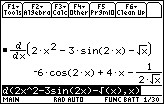 |
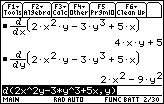 |
| 2: |
This will integrate an expression
with respect to an indicated variable. You can also access this function on the homescreen using Definite integrals can also be found. |
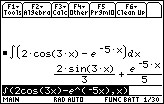 |
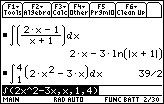 |
| 3:limit limit(expression, var, point) |
Returns a limit with respect to
an indicated variable. Direction can be indicated with negative = from left, and positive = from right. Limits can be sensitive to rounding error. |
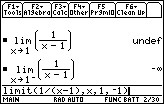 |
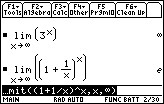 |
| 4: |
This will evaluate an expression
at discrete variable values within a given range and then calculates the product. |
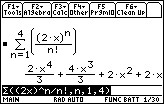 |
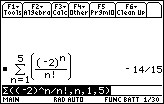 |
| 5: |
This evaluates an expression for
each value of the indicated variable from low to high, and returns the product of the results. |
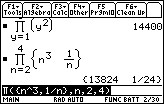 |
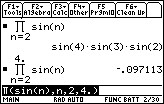 |
| 6:fMin fMin(expression,var) |
This finds candidate
values of the indicated variable that minimize or maximize the expression. |
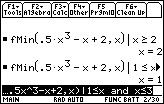 |
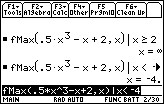 |
| 7:fMax fMax(expression,var) | |||
| 8:arcLen arcLen(expression1,var,start,end) |
Evaluates the arc length of
an expression with respect to the indicated variable. |
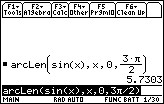 |
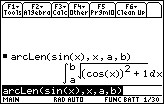 |
| 9:taylor Taylor(expression,var,order,[point]) |
Returns a Taylor polynomial of the
indicated degree and expansion point. The default expansion point is 0. |
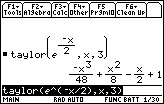 |
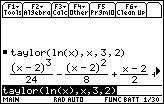 |
| A:nDeriv nDeriv(expression,var,[h]) |
Evaluates the numerical derivative
of the expression. |
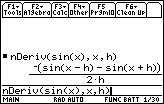 |
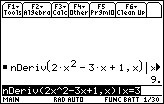 |
| B:nInt nInt(expression1,var,lower,upper) |
Evaluates a numerical integral. | 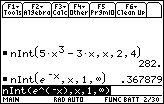 |
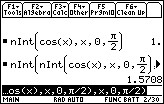 |
| C:deSolve deSolve(1stOr2ndOrderOde, independentVar,dependentVar) |
Returns an equation that explicitly
or implicitly specific a general solution to the 1st- or 2nd-order ODE. |
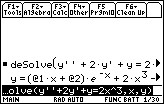 |
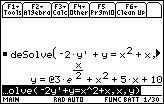 |